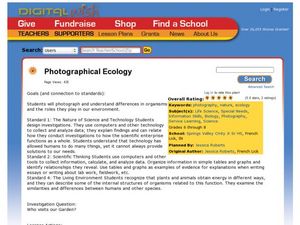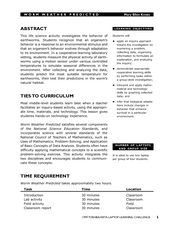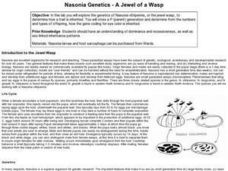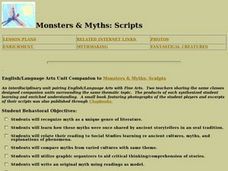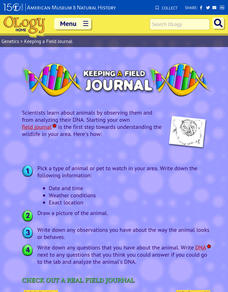Curated OER
Annual Skinner Box Rat Training Competition
Students explore animal behvior. Using Skinner boxes, they monitor and train rats to accomplish a set of tasks. They maintain a log of observations, task completions and data.
Curated OER
Territorial Behavior in Dragonflies and Damselflies
Students explore dragonfiles/damselfiles and their behaviors. They examine their differences and their life cycles. Students observe the dragonflies in a field and determine the number of different species.
Curated OER
Survival Under a Rock
Young scholars investigate ways that animals adapt to their environments through hands-on activities using isopods and an interactive video.
Curated OER
The Effect of Automobile Exhaust on Hydra in an Environmental Chamber
High schoolers study the structure and habitat of the hydra in this lab lesson. Students determine if the hydra can be used as an indicator to detect pollution from automobile exhaust.
Curated OER
Effects of Water Pollution on Aquatic Organisms
Students investigate water pollution. They develop an understanding of the behavior of organisms, of the structure and properties of matter, and of natural and human induced hazards by conducting lab tests. They present their data...
Curated OER
Hawaii's Freshwater Animals - Species Report
Students explore biology by creating a report for the class. In this oceanography lesson, students research and identify the survival characteristics of a list of freshwater animals by utilizing the Internet and library. Students...
Curated OER
Natural Born Robots: Body Builders
Learners perform activities to explore how their arm works and what muscles are involved. They view animated comparisons of human and robotic arms. Students create a model of the human arm.
Howard Hughes Medical Institute
Winogradsky Columns: Microbial Ecology in the Classroom
Winogradsky columns are ideal for observing the role of bacteria and other microorganisms in an ecosystem. This student activity guide is complete with data tables for observations and analysis questions for processing what was observed....
Curated OER
Photographical Ecology
Students study organisms and the roles they play in nature. In this ecology lesson, students photograph several examples of organisms during a nature walk. Students print out their photos and classify the organisms as plants or animals.
Curated OER
Worm Weather Predicted
Students examine worm habitats. In this animal habitats instructional activity, students participate in a lab activity that requires them to explore the adaptations that earthworms make to their environment.
Curated OER
Population Density
Students use the scientific method to conduct an experiment and use varied methods to gather background information. They correctly use lab equipment and prepare tables and graphs that organize, conclude, and present their findings. ...
Curated OER
Nasonia Genetics-A Jewel of a Wasp
Students investigate the inheritance pattern of eye color in Nasonia wasps. In this genetics and inheritance lesson plan, students read about the life cycle of Nasonia wasps and hypothesize about the possibilities of eye color inherited...
Curated OER
Monster and Myths: Scripts
Students explore characteristics of the myth genre. In this myth lesson, students become familiar with various myths and the cultures they were derived from. Students compare in a graphic organizer. Students write original myths and...
American Museum of Natural History
Keeping a Field Journal
Recording scientific evidence allows for important discoveries and conclusions. A remote learning resource outlines how to create a field journal to record scientific observations. The outline resource includes notation about the...
American Museum of Natural History
Keeping a Field Journal
Young scientists begin a field journal by following four steps. A real-world example of an entry showcases the different parts, including location, date, drawings, and more.
Code.org
Events Unplugged
Introduce event-driven programming. Young computer scientists learn the meaning of event-driven programming and how it is different from previous styles of programming. They play a card game to simulate the challenges that occur in this...
Curated OER
Integrating Technology In Your Classroom
You can try these management tips and lessons to help you confidently integrate technology into your curriculum.
Curated OER
A Natural Habitat: What, How and Why
Students understand what a habitat is. They determine why a habitat is important to our environment no matter where it is located. Students observe and recognize natural habitats in their surroundings.
Curated OER
Survival of the Fittest
Sixth graders create their own "never before seen" marine creatures and examine how not all creatures in the sea swim, not all have sharp teeth










